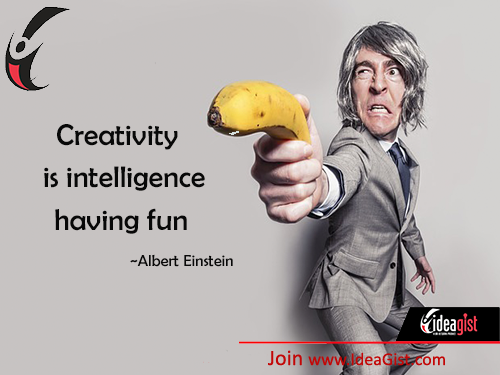Albert Einstein insinuates a lively, reciprocal relationship between creativity and intelligence when he said, “Intelligence is creativity having fun.” Of course, it's a bit more complex than Mr. Einstein suggests.
The traditional definition of Intelligence is “the ability to acquire and utilize knowledge.” When one's intelligence quotient (IQ) is tested, the results are measured by the ability to understand, gather, and apply information obtained over time to solve different problems.
Creativity is a person's ability to come up with new ideas by mentally connecting existing concepts. Despite common perceptions, ideas reached through creative thinking don't need to be revolutionary; They simply need to be new to the thinker.
The role intelligence plays in creative thinking may surprise you
Intelligence certainly plays a role in creative thinking, but maybe not in ways you might expect. A person's IQ is usually measured by their ability to interpret information and apply that information to different circumstances. We place a high intelligence value on mathematics and sciences because these subjects demonstrate an ability to apply theories to solve problems. Intelligence allows the thinker to filter solutions methodically and effectively.
But intelligence only goes so far when it comes to creative thinking.
People who excel; at attaining knowledge through traditional learning methods such as reading, watching documentaries and informational videos, or attending lectures usually have an aptitude for storing and utilizing knowledge effectively. However, knowledge gatherers can lack the ability to efficiently filter solutions. An intelligent person may have a talent for generating useful ideas, but it may take them a long time to do so, whereas creative thinkers are able to filter ideas quickly.
A high IQ is not essential to creativity
Creative thinkers apply their stored knowledge to new situations in a unique way and have an uncommon ability to promptly sift through problems and ideas to identify potential outcomes.
A person doesn't necessarily need a high IQ to develop creative ideas. In fact, an individual with an average level of knowledge can have the creative potential of Albert Einstein. Entrepreneurial geniuses like Bill Gates and Steve Jobs have both expressed their belief that creativity is simply a matter of “connecting things.”
Connecting experiences and random concepts for creative ideas
Creative people will tell you that they don't really stretch their brains to come up with inventive ideas. Jobs, Gates, and other entrepreneurial savants have said that their creative ideas tend to develop from something that seemed obvious to them over time. They have the ability to connect experiences to problems, and that way they develop fresh ideas for new products and business concepts.The common denominators among successful creative thinkers include the fact that they've had more experiences than others, and they give more thought to their experiences than others are inclined to impart.
Intelligence is important because it demonstrates one's ability to accumulate knowledge and use it effectively. Creativity takes a person beyond the framework of intelligence to leverage and synthesize presumably random concepts.
Three characteristics of successful idea-makers
In a nutshell, successful creative thinkers don’t need higher levels of intelligence than the average Joe. The characteristics that set them apart? They have more experiences than others, they think about their experiences more frequently than others, and when they begin to pursue potential outcomes on problems or projects, they spend more time working on their ideas than others do.In fact, the majority of people who set out to pursue their own entrepreneurial journey give up after evaluating only one or two potential ideas, or when their inner detractor inhibits them from continuing their pursuit.
Creativity-intelligence relationship

